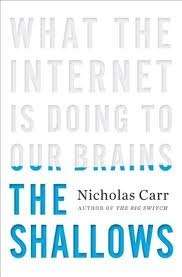out of The Shallows and on to the beach: thoughts and prescriptions
This is not an Internet-bashing post. My Internet usage may be affecting my life in ways I find disturbing, but it also has many great benefits. All of my writing friends are online. I regularly encounter blogs, articles, images, videos and podcasts that inform, entertain and inspire me. And it’s the Internet that makes it even possible for me to have a career self-publishing ebooks.
With that out of the way, here’s my response to Nicholas Carr’s The Shallows: What the Internet Is Doing to Our Brains.

Two Points
There are two points that Carr makes in his book that struck home for me.
1. The Internet is rewiring our brains for quick thinking, not deep thinking. Our adult brains are still very plastic. The things we do rewire our brains. According to Carr, Internet usage overloads our working memory, distracts us with the allure of the new and immediate, and interrupts the work of thinking.
2. When we outsource our memory to the Internet, we diminish the richness of our own intellectual lives. Carr points out that human memory is not a mere data storage and retrieval system. Memorization is no rote process, but one of synthesis and creativity. Memory is “as much a crucible as a container. It … [is] more than the sum of things remembered. It … [is] something newly made, the essence of a unique self.”
Tools, Carr explains, end up numbing the part of the body they amplify. The map diminished the ability of the brain to remember a landscape in rich detail. The clock separated us from the natural rhythms of life. So, too, does reliance on the Internet come with a cost.
What This Means to Me
As a creative individual, both of these points worry me.
I know this about my creative process: I need time and space and silence in which to think.
I grew up before the Internet had a stranglehold on our daily lives, so I remember well afternoons spent just dreaming and thinking. I continually draw from the store of imagery I built up as a child. Phrases and fancies from those golden days still find their way into my fiction. And I worry because my adult life is so busy and distracted that I don’t have time to replenish the well in the same way.
I don’t have–no, I don’t give–myself time to think deeply.
I also know how closely related memory is to the creative process. Memory encompasses not only facts, but sensory details and emotions. It’s the synthesis of what we know that gives us fresh stories. And if I’m all over the Internet, tweeting here and blogging there and buying curricula while listening to a podcast, then I am overloading my poor brain. I’m not giving it time to consolidate long-term memories which would enrich my creative and intellectual life.
Now What? The Plan
So. Now I know the problem. What are the solutions?
1. Regular Internet Hiatuses
I have this sense that if I’m offline for long, I’ll lose my friends, hemorrhage my blog followers and sink my sales. That may happen, but I know that for long-term productivity I need to get offline. Internet hiatuses can span hours–like a tech-free evening at home–to days. The world will still go on while I’m gone.
2. Journaling
I’m a journaling dropout. I aim to rectify this by keeping two journals–one a personal journal in which I write whatever I want, and the other a reading journal, sort of like a commonplace book.
3. Intentional Reading
I have two lists of books I want to read: one fiction and one non-fiction. The fiction book list is based off NPR’s list of Top 100 Science Fiction & Fantasy books. The non-fiction list includes books on history, theology, science, and biographies. I’m still building that one, so if you have a recommendation, let me know!
4. A Hobby That Does Not Involve Computers
In the past I’ve sketched, crocheted, played piano, and embroidered. These days I doodle. Easy to pick up, easy to put down, and nigh-on impossible to do wrong.
Your Turn
Do you have any bad habits that you want to replace with positive ones? Any changes you want to make in your lives? How are you going about it?




